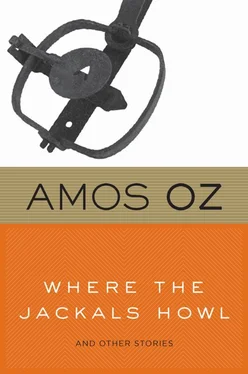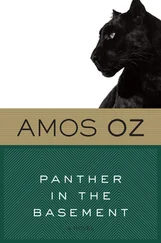Amos Oz - Where the Jackals Howl
Здесь есть возможность читать онлайн «Amos Oz - Where the Jackals Howl» весь текст электронной книги совершенно бесплатно (целиком полную версию без сокращений). В некоторых случаях можно слушать аудио, скачать через торрент в формате fb2 и присутствует краткое содержание. Год выпуска: 2012, Издательство: Houghton Mifflin Harcourt, Жанр: Современная проза, на английском языке. Описание произведения, (предисловие) а так же отзывы посетителей доступны на портале библиотеки ЛибКат.
- Название:Where the Jackals Howl
- Автор:
- Издательство:Houghton Mifflin Harcourt
- Жанр:
- Год:2012
- ISBN:нет данных
- Рейтинг книги:4 / 5. Голосов: 1
-
Избранное:Добавить в избранное
- Отзывы:
-
Ваша оценка:
- 80
- 1
- 2
- 3
- 4
- 5
Where the Jackals Howl: краткое содержание, описание и аннотация
Предлагаем к чтению аннотацию, описание, краткое содержание или предисловие (зависит от того, что написал сам автор книги «Where the Jackals Howl»). Если вы не нашли необходимую информацию о книге — напишите в комментариях, мы постараемся отыскать её.
Where the Jackals Howl — читать онлайн бесплатно полную книгу (весь текст) целиком
Ниже представлен текст книги, разбитый по страницам. Система сохранения места последней прочитанной страницы, позволяет с удобством читать онлайн бесплатно книгу «Where the Jackals Howl», без необходимости каждый раз заново искать на чём Вы остановились. Поставьте закладку, и сможете в любой момент перейти на страницу, на которой закончили чтение.
Интервал:
Закладка:
Again the nomad replied in his own language. Now a note of terror filled his voice. With soft, silent steps he recoiled and withdrew as though from a dying creature. She was breathing heavily now, panting, trembling. A single wild syllable escaped from the shepherd’s mouth: a sign between him and his goats. The goats responded and thronged around him, their feet pattering on the carpet of dead leaves like cloth ripping. The crickets fell silent. The goats huddled in the dark, a terrified, quivering mass, and disappeared into the darkness, the shepherd vanishing in their midst.
Afterward, alone and trembling, she watched an airplane passing in the dark sky above the treetops, rumbling dully, its lights blinking alternately with a rhythm as precise as that of the drums: red, green, red, green, red. The night covered over the traces. There was a smell of bonfires on the air and a smell of dust borne on the breeze. Only a slight breeze among the fruit trees. Then panic struck her and her blood froze. Her mouth opened to scream but she did not scream, she started to run and she ran barefoot with all her strength for home and stumbled and rose and ran as though pursued, but only the sawing of the crickets chased after her.
6
SHE RETURNED to her room and made coffee for all the members of the secretariat, because she remembered her promise to Etkin. Outside the cool of evening had set in, but inside her room the walls were hot and her body was also on fire. Her clothes stuck to her body because she had been running, and her armpits disgusted her. The spots on her face were glowing. She stood and counted the number of times the coffee boiled — seven successive boilings, as she had learned to do it from her brother Ehud before he was killed in a reprisal raid in the desert. With pursed lips she counted as the black liquid rose and subsided, rose and subsided, bubbling fiercely as it reached its climax.
That’s enough, now. Take clean clothes for the evening. Go to the showers.
What can that Etkin understand about savages. A great socialist. What does he know about Bedouins. A nomad sniffs out weakness from a distance. Give him a kind word, or a smile, and he pounces on you like a wild beast and tries to rape you. It was just as well I ran away from him.
In the showers the drain was clogged and the bench was greasy. Geula put her clean clothes on the stone ledge. I’m not shivering because the water’s cold. I’m shivering with disgust. Those black fingers, and how he went straight for my throat. And his teeth. And the goats. Small and skinny like a child, but so strong. It was only by biting and kicking that I managed to escape. Soap my belly and everything, soap it again and again. Yes, let the boys go right away tonight to their camp and smash their black bones because of what they did to me. Now I must get outside.
7
SHE LEFT the shower and started back toward her room, to pick up the coffee and take it to the secretariat. But on the way she heard crickets and laughter, and she remembered him bent down on all fours, and she was alarmed and stood still in the dark. Suddenly she vomited among the flowering shrubs. And she began to cry. Then her knees gave way. She sat down to rest on the dark earth. She stopped crying. But her teeth continued to chatter, from the cold or from pity. Suddenly she was not in a hurry any more, even the coffee no longer seemed important, and she thought to herself: There’s still time. There’s still time.
Those planes sweeping the sky tonight were probably on a night-bombing exercise. Repeatedly they roared among the stars, keeping up a constant flashing, red, green, red, green, red. In counterpoint came the singing of the nomads and their drums, a persistent heartbeat in the distance: One, one, two. One, one, two. And silence.
8
FROM EIGHT-THIRTY until nearly nine o’clock we waited for Geula. At five to nine Etkin said that he could not imagine what had happened; he could not recall her ever having missed a meeting or been late before; at all events, we must now begin the meeting and turn to the business on the agenda.
He began with a summary of the facts. He gave details of the damage that had apparently been caused by the Bedouins, although there was no formal proof, and enumerated the steps that had been taken on the committee’s initiative. The appeal to good will. Calling in the police. Strengthening the guard around the settlement. Tracking dogs. The meeting with the elder of the tribe. He had to admit, Etkin said, that we had now reached an impasse. Nevertheless, he believed that we had to maintain a sense of balance and not give way to extremism, because hatred always gave rise to further hatred. It was essential to break the vicious circle of hostility. He therefore opposed with all the moral force at his disposal the approach — and particularly the intentions — of certain of the younger members. He wished to remind us, by way of conclusion, that the conflict between herdsmen and tillers of the soil was as old as human civilization, as seemed to be evidenced by the story of Cain, who rose up against Abel, his brother. It was fitting, in view of the social gospel we had adopted, that we should put an end to this ancient feud, too, just as we had put an end to other ugly phenomena. It was up to us, and everything depended on our moral strength.
The room was full of tension, even unpleasantness. Rami twice interrupted Etkin and on one occasion went so far as to use the ugly word “rubbish.” Etkin took offense, accused the younger members of planning terrorist activities, and said in conclusion, “We’re not going to have that sort of thing here.”
Geula had not arrived, and that was why there was no one to cool down the temper of the meeting. And no coffee. A heated exchange broke out between me and Rami. Although in age I belonged with the younger men, I did not agree with their proposals. Like Etkin, I was absolutely opposed to answering the nomads with violence — for two reasons, and when I was given permission to speak I mentioned them both. In the first place, nothing really serious had happened so far. A little stealing perhaps, but even that was not certain: every faucet or pair of pliers that a tractor driver left in a field or lost in the garage or took home with him was immediately blamed on the Bedouins. Secondly, there had been no rape or murder. Hereupon Rami broke in excitedly and asked what I was waiting for. Was I perhaps waiting for some small incident of rape that Geula could write poems about and I could make into a short story? I flushed and cast around in my mind for a telling retort.
But Etkin, upset by our rudeness, immediately deprived us both of the right to speak and began to explain his position all over again. He asked us how it would look if the papers reported that a kibbutz had sent out a lynch mob to settle scores with its Arab neighbors. As Etkin uttered the phrase “lynch mob,” Rami made a gesture to his young friends that is commonly used by basketball players. At this signal they rose in a body and walked out in disgust, leaving Etkin to lecture to his heart’s content to three elderly women and a long-retired member of Parliament.
After a moment’s hesitation I rose and followed them. True, I did not share their views, but I, too, had been deprived of the right to speak in an arbitrary and insulting manner.
9
IF ONLY Geula had come to the meeting and brought her famous coffee with her, it is possible that tempers might have been soothed. Perhaps, too, her understanding might have achieved some sort of compromise between the conflicting points of view. But the coffee was standing, cold by now, on the table in her room. And Geula herself was lying among the bushes behind the Memorial Hall, watching the lights of the planes and listening to the sounds of the night. How she longed to make her peace and to forgive. Not to hate him and wish him dead. Perhaps to get up and go to him, to find him among the wadis and forgive him and never come back. Even to sing to him. The sharp slivers piercing her skin and drawing blood were the fragments of the bottle she had smashed here with a big stone at the beginning of the evening. And the living thing slithering among the slivers of glass among the clods of earth was a snake, perhaps a venomous snake, perhaps a viper. It stuck out a forked tongue, and its triangular head was cold and erect. Its eyes were dark glass. It could never close them, because it had no eyelids. A thorn in her flesh, perhaps a sliver of glass. She was very tired. And the pain was vague, almost pleasant. A distant ringing in her ears. To sleep now. Wearily, through the thickening film, she watched the gang of youngsters crossing the lawn on their way to the fields and the wadi to even the score with the nomads. We were carrying short, thick sticks. Excitement was dilating our pupils. And the blood was drumming in our temples.
Читать дальшеИнтервал:
Закладка:
Похожие книги на «Where the Jackals Howl»
Представляем Вашему вниманию похожие книги на «Where the Jackals Howl» списком для выбора. Мы отобрали схожую по названию и смыслу литературу в надежде предоставить читателям больше вариантов отыскать новые, интересные, ещё непрочитанные произведения.
Обсуждение, отзывы о книге «Where the Jackals Howl» и просто собственные мнения читателей. Оставьте ваши комментарии, напишите, что Вы думаете о произведении, его смысле или главных героях. Укажите что конкретно понравилось, а что нет, и почему Вы так считаете.












